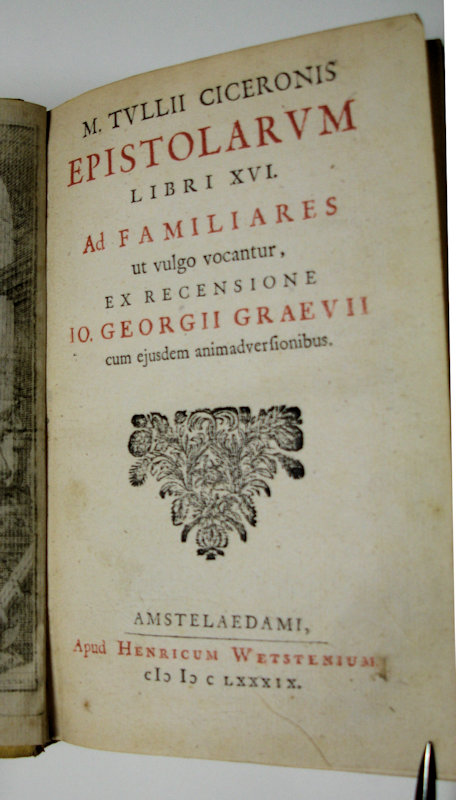CICERO.
M. Tullii Ciceronis Epistolarum libri XVI. Ad familiares, ut vulgo vocantur, ex recensione Io. Georgii Graevii cum ejusdem animadversionibus.
Amsterdam (Amstelaedami), Apud Henricum Wetstenium, 1689.
12mo. Frontispiece, (X),638,(15 indices),(1 blank) p. Boards of ca. 1800. 16 cm (
Ref: Schweiger 2,162; Dibdin 423; Moss 1,329; Graesse 2,169) (
Details: Gilt black shield on the back. The frontispiece depicts a seated Cicero giving a messenger a letter. Title in red and black) (
Condition: Cover scuffed, worn at the extremes. Head & tail chafed. Shield slightly damaged. Front joint cracking but strong. Paper slightly yellowing) (
Note: For centuries the Roman orator, author and politician Cicero retained a central position as a school author and a model for good writing, on protestant schools and in Jesuit colleges. The period of his greatest glory was the Renaissance, when he became the object of a literary cult called Ciceronianism. Many humanists took him as an absolute model for pure Latin, and an elegant style. Petrarch modeled his own 'Epistolae Familiares' in part on Cicero's 'Epistulae ad Familiares'. Petrarch created, like Cicero, in his letters 'a kind of autobiography and a partial history of his own life and time. Even as Petrach rebuked Cicero for being too Ciceronian in other words, he helped establish Cicero as a uniquely powerful stylistic model and intellectual resource'. (The Classical tradition, N.Y., 2010, p. 196)
The Epistulae ad Familiares form a part of the epistolary oeuvre of Cicero consisting of letters addressed to public figures like Pompeius Magnus, Caesar, and Pollio, et personal letters to his wife Terentia, or his secretary Tiron. They were written between 63 and 43 B.C., and are arranged according to the addressee. The style of Cicero's letters varies very much. Many of them deal with official business, there are also polished manifesto's in letter form. 'Others have a less formal tone, while others again (...) on private affaires have no stylistic pretensions at all, but consist of short, elliptic sentences, packed with idiomatic phrases. (...) This, (...) shows the essential soundness of his style; it was not an artificial dialect for the use of literary men, but the speech of his own people, purified, carefully arranged, and made more flexible and expressive'. (H.J. Rose, 'A handbook of Latin literature', London, 1964, p. 165) The Dutch classical scholar of German descent Johann Georg Greffe, or Graeve, better known als Graevius, 1632-1703, professor of Latin at the Univerisity of Utrecht during the last forty years of his life, edited separate editions of Cicero's Letters, De Officiis, Cato, Laelius, Paradoxa and the Somnium Scipionis, and the speeches. He published also between 1684 and 1699 an 'opera omnia' edition of Cicero 'cum notis Variorum' ) (
Collation: pi1 (frontispiece), *6 (minus leaf *6), A-2D12, 2E4 (minus blank leaf E4)) ((Photographs on request)
Book number: 120047 Euro 90.00
Keywords: (Oude Druk), (Rare Books), Briefe, Cicero, Correspondence, Epistulae, Latin literature, Letters, antike altertum antiquity, epistulae ad familiares, römische Literatur
 CICERO.
CICERO.

